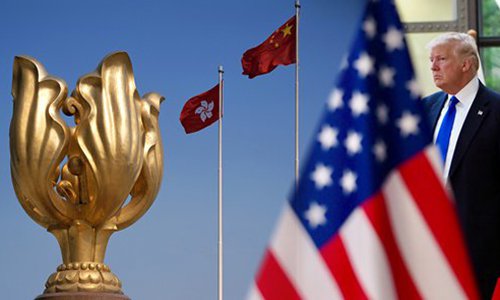HOME >> OPINION
US approach to Hong Kong problem puts trade negotiations in trouble
By Zhao Minghao Source:Global Times Published: 2019/8/25 17:38:39

Photo: VCG/Xinhua
Recently, US officials, including President Donald Trump, Vice President Mike Pence and Secretary of State Mike Pompeo have commented on the Hong Kong situation on different occasions. Trump warned China on August 18 that violent crackdown on the protests in Hong Kong would harm trade talks with the US. Expected to be held in September, the 13th round of China-US trade talks is still subject to uncertainty. If the US continues to step up its interference in the Hong Kong affairs, it would become more difficult to reach an agreement between the two countries to end the trade war.
Trump, for some time in the past, tended to be cautious on the Hong Kong problem. Unlike many US politicians, Trump himself is reluctant to hype up human rights and democracy issues for political gains. He may be well aware that over the past decades, the US efforts to spread democracy worldwide have not brought stability and prosperity to the countries concerned, but have instead largely wasted the US taxpayers' money. Besides, in terms of his concept of governing the country, Trump values order and tends to detest street politics that causes economic and social chaos.
But a certain number of Americans are not satisfied with such restrained attitude on the Hong Kong affairs, especially when the hawks are trying to make the Hong Kong problem a bargaining chip. It is no secret that the US has been behind regime changes in many countries, an approach Washington employs a lot for its national interests.
Some Hong Kong activists have been found to have close connections with Washington, apparently not limited to handshakes and casual conversations with senior US officials at the White House. According to the Hong Kong-based newspaper Ta Kung Pao, Christian Whiton, former senior adviser for strategic communications at US Department of State, has close relations with Mark Simon, assistant to Jimmy Lai Chee-ying, one who supports many Hong Kong-secession activities.
It is a part of the US government's China policy to step up the offensive against Beijing in the ideological field. Hal Brands, senior fellow at the Center for Strategic and Budgetary Assessment, said, "Today, the United States should play up rather than play down the ideological clash between liberalization and authoritarianism", and called for Washington to "embrace the ideological competition." Some American strategists have made it clear in their published articles that it may help Washington win the strategic competition with Beijing if China is depleting its resources in various domestic crises.
The China-US economic and trade negotiations are in grave difficulties. A series of recent moves by the Trump government, including designating China a "currency manipulator," have seriously damaged trust between the two sides. An increasing number of Chinese analysts now believe what the White House is trying to seek is not a trade deal with China at all, but "decoupling" between the two countries. Meanwhile, there is an increasing possibility that the US is going to have an economic recession next year. China-US trade war has indeed tremendously harmed US businesses and consumers.
Washington has successively sent negative signals to Beijing amid heightened uncertainties over trade talks. In addition to stepping up its intervention in Hong Kong, the US also approved a new round of arms sales to Taiwan. A Uyghur-American has been appointed to the White House National Security Council as an official responsible for US policy toward China. Faced with the provocative moves by Washington, Beijing is making an in-depth assessment of the strategic intentions of the US. It may not be surprising if the 13th round of China-US trade talks fail to take place as scheduled or end without a favorable outcome.
The author is a senior research fellow at the Charhar Institute and an adjunct fellow at the Chongyang Institute for Financial Studies at Renmin University of China. opinion@globaltimes.com.cn
RELATED ARTICLES:
Posted in: VIEWPOINT